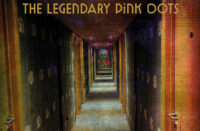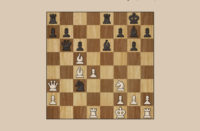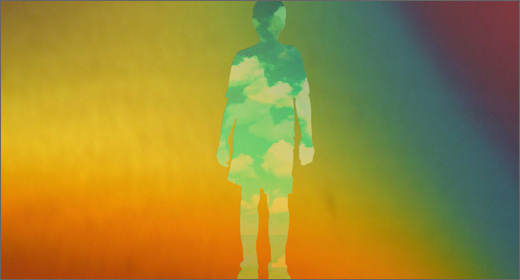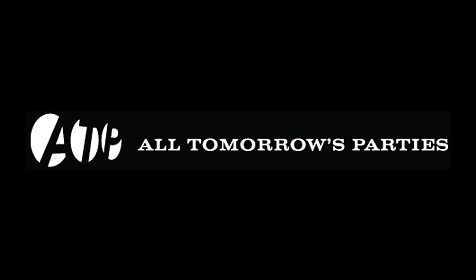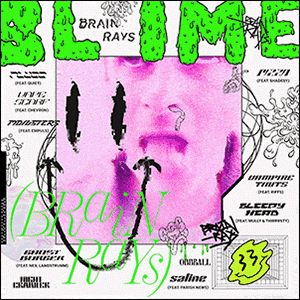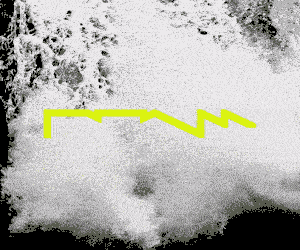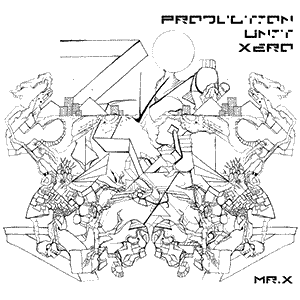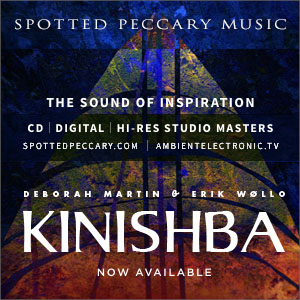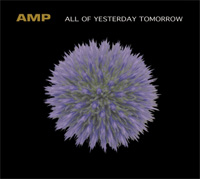
(07.20.07) London-based independent label RROOPP release their second multi-disc
artist compilation, this time by Amp, a band with a 15 year history in
experimental music built around the core duo of Richard Amp and singer
Karine Charff. All of Yesterday Tomorrow comprises of 38 tracks spanning
their history; 12 unreleased songs, alternate versions and demos, 10
tracks from their out-of-print 1998 singles album Passé – Présent, and
16 further non-album, vinyl only and compilation tracks, all of which
have been remastered for this release. As with their first release,
RROOPP have packaged this album in a luxurious glossy quad-fold digipak
with comprehensive sleeve notes on each track including a biography of
the band, exclusive text and pictures and details of former band members
and collaborators. RROOPP clearly have an eye for detail in both
aesthetic and musical content that is illustrated in the presentation of
both this and their previous Yellow 6 compilation, The Beautiful Season
Has Passed.
Amp’s music is an experimental, edgier take on the early 90’s
guitar-based shoegazer sound that could be categorised along with Loop,
My Bloody Valentine, Galaxie 500 or even Slowdive. Constructed around
droning, decaying, noisy guitars, their music forms dense layers of
sound that create beauty within themselves. Amp however are more than
just a derivative of the shoegazer genre; they may have started out
along these lines and continued to return to this formula but along the
way they have chosen to push the boundaries of their experimentation
further. Throughout this compilation they deviate from their layered
guitar focused style to introduce electronic elements and acoustic song
structures to their repertoire.
Disc one opens with “Sketch a Star;” although recorded in 2000 and
previously unreleased, it was always intended as an introductory piece.
As the prelude to a journey through the various incarnations of the band
it provides the perfect insight into what to expect from the rest of the
compilation and what the Amp sound is about. The radiant foundry-like
drone of “Sketch a Star” with its layers of guitar and fuzzy distortion
grinds along until it collapses in on itself in a mass of crashing
distortion. Also featured is Amp’s first real studio recording and
commercial release; the limited edition Remember 7″ on Linda’s Strange
Vacation Records from September 1995. Featuring slightly less dense
guitars, the track abruptly switches direction early on, adopting a tone
more in keeping with their shoegazing contemporaries with a psychedelic
post-punk twist. Venturing further back to the early days of the band,
“There She Goes,” a track from Amp’s first self-released cassette album
Greensky Bluetree and featuring their first (and short-lived) vocalist
Jo, is a gentle piece based around piano and flute alongside Jo’s gentle
harmonies. The 10 minute “Alrightfarout” however, from their third album
Astralmoonbeamprojections, takes their sound in an entirely different
direction, that of a desolate windswept drone ambient piece which
focuses on texture and mood to great effect. Similarly, “Lutin” – the
flipside to 1997’s Beyond single – has a tense, cinematic quality that
slowly unfolds with stark ambience. The harrowing “Frise” from a 1996
single release builds on this sound, adding a dark apocalyptic edge,
obscured vocals and frantic rhythmic beats deep in the mix. Two further
tracks on this disc – “Walking a Line” from late 1996/early 1997 and A
Small Light from 2002 – are both previously unreleased; the former
being an experiment with tape loops and delays and the second an
acoustic guitar track augmented with some electric guitar drone work.
Disc closer “Fine Day,” a compilation track originally recorded in 2005,
is probably the closest to a traditional song structure with Charff’s
vocals beautifully complimented with acoustic guitar and flute.
Having already showcased a willingness to experiment with their music
and take it in new directions, All of Yesterday Tomorrow‘s second disc
opens with 1997’s “Beyond” offering a further flirtation with electronic
experimentation. Taking their trademark guitar drones and fusing them
with dubby electronic bass, “Beyond” sees Charff’s indie styled vocals
placed more prominently in the mix. This is followed by “Get There,” the
B-side to their debut single Remember featured on disc one and taken
from their first real studio session. Similar to “Remember,” “Get There”
features a wall of screaming guitar chaos battling with Charff’s 60’s
styled spoken word vocals, the result resembling a drug induced
psychedelic trip. The mood continues into the previously unreleased
“Silencer” from 2000, a generally darker mood descending on Charff’s
haunting processed vocal partially obscured by uneasy swathes of
criss-crossing guitar drones. In complete contrast, 1999’s “Standing in
the Darkest Corner of the Room,” originally recorded for their fifth
album L’Amour Invisible but discarded and later released as a
compilation track, pulsates and simmers while Charff’s spoken word
musings slowly unravel. The 1996 single track “Le Petit Chat” for
Wurlitzer Jukebox – with “Frise” on the flip – has an avant-garde
European quality with an unusual odd jaunty, playful mood. The first of
two longer tracks, the 10 minute “Noir et Noir” focuses more on ominous
atmospheric drones with Charff’s spoken words layered over it while the
13 minute “Lutin 2,” the 1996 sister track to “Lutin” on disc one, is
based around dense harrowing drones and energetic freeform drumming.
Originally recorded for the 1998 album Stenorette on Kranky but dropped
and released as a 10″ single and on several compilations, “Left It (Too
Late)” mixes the heady psychedelic guitar maelstrom experienced earlier
with a classic mid-90’s Manchester influence. Of the remaining
unreleased tracks on this disc, “Miles’N,” originally rejected from
Amp’s sixth studio album Us, fuses the drug hazed retro vocal style of
“Get There” with a distinctly modern sharp electronic beat, “Ipso
Factum” is acoustically based with deep bass accompaniment and an
introspective melancholic mood while disc two’s closing track
“Baudelaire,” also rejected from their fourth album Stenorette, features
impassioned vocals alongside insistent drumming and piano.
Disc three opens with “Ombres” from a 1996 split single with Third Eye
Foundation and features uneasy swirling guitar set to Charff’s soft
vocals. The theme is maintained but enhanced with edgy piano on “Je
Veux,” another track originally destined for Stenorette that remained
unreleased until now. Looking further into the archives, the unreleased
“Televisionface,” originally considered for Us but rejected, picks up
the pace with a dark driving beat and Richard Amp’s increasingly manic
80’s electro/New Wave vocal style. Also featured is a demo of the track
“Tomorrow” – also from the Stenorette album – and featuring their
trademark guitar work mixed with Charff’s dreamy vocals and a French
accordion effect. Disc three also features three cover versions; Amp’s
refreshing minimal drone and acoustic guitar reinterpretation of the
traditional tune “Scarborough Fair,” a rhythmic and upbeat take on the
Silver Apples’ “Seagreen Serenades” with typically undecipherable vocals
and Amp’s slow trudging take on “So Hot (Wash Away All of My Tears)” by
Spaceman 3. Delving into their archive of hard to find singles and
compilation tracks, “Yonder” from the Passé – Présent album – inspired
by the track “Beyond” on disc two – features dense swirling guitars,
dubby basslines and rattling beats. Similarly, “Moon Tree,” originally
recorded in 1990-91 for The Distance project and previously only
released as a compilation track, mixes drifting ambient texture with
increasingly dense guitar experimentation. Japanese compilation track
“Watchin'” from 2001-02 offers a further dalliance with electronic music
as bursts of guitar mayhem swarm around Charff’s spoken word lyrics,
gentle harmonies and a glitchy electronic backdrop. Closing the
compilation is the 10 minute previously unreleased track “When You Have
Love,” a gently reflective piano piece with orchestral backing and
heartbeat-like drumming with steadily evolving level of ambience
underpinning it all.
Providing something for both the interested newcomer and established fan
of the band, All of Yesterday Tomorrow offers an excellent insight into
a cross-section of Amp’s output over the years. RROOPP again do an
excellent job with the packaging and detailed information they provide,
making them a label to watch for future retrospective releases. [Purchase]







